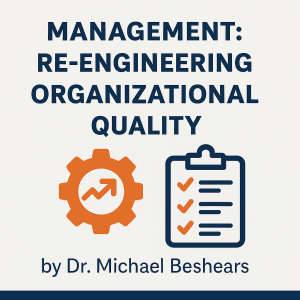Management: Re-engineering Organizational Quality
 Management: Re-engineering Organizational Quality
Management: Re-engineering Organizational Quality
By Dr. Michael Beshears
Re-engineering, from a quality management perspective, is about achieving optimal efficiency. It is a process aimed at maximizing resources, especially human resources, by integrating multiple processes into a streamlined system (Fetais, 2022). However, from the viewpoint of line-workers and other stakeholders, re-engineering often carries negative connotations, frequently associated with change, cutbacks, or being expected to do more with less.
While such perceptions are common, they do not reflect the true intent of re-engineering. At its core, quality management seeks to improve processes for the benefit of all stakeholders, including staff. Although re-engineering may require staff to take on new responsibilities, be retrained, or see their duties realigned, these changes are designed to enhance organizational performance and ensure long-term success. This reality can temporarily lower morale, but such disruption is part of the necessary adaptation to change (Mukhlis, 2024).
Walking the Talk
It is easy for scholars to write about re-engineering in theoretical terms, but in practice, the process is complex. Quality managers must not only “talk the talk” but also “walk the walk” by managing resistance and guiding staff through the transition. Due to its significant impact, re-engineering requires visible support from top leadership. A senior executive must serve as both visionary and motivator to ensure the organization stays focused on long-term benefits despite short-term discomfort (Phillips et al., 2022).
Is Re-engineering Good?
The answer is yes, and its benefits can be seen from three perspectives:
Managerial and Financial Perspective
Re-engineering reduces costs while improving efficiency and quality in products and services (Fetais, 2022).
External Customer Perspective
When processes improve, customers enjoy higher-quality products and services. Ideally, the experience exceeds expectations, what is often referred to as “delighting the customer.” Satisfied customers are more likely to return and recommend the organization to others, creating long-term growth (Mukhlis, 2024).
Internal Customer (Employee) Perspective
Applying Kurt Lewin’s three stages of change, unfreezing, moving, and refreezing, re-engineering eventually leads to benefits for staff as well. Once employees adapt to new roles and responsibilities, they often experience greater empowerment, engagement, and morale. In time, the workforce may become even stronger than before the changes (Phillips et al., 2022).
Conclusion
Re-engineering is not just a managerial buzzword, it is a powerful tool for organizational transformation. While staff may initially resist or feel burdened by change, the long-term payoff is worth the challenge. With strong leadership, clear communication, and support for all stakeholders, re-engineering can lead to cost savings, delighted customers, and empowered employees.
References
Fetais, A. (2022). Business process re-engineering: A literature review. Information, 13(4), 185. https://doi.org/10.3390/info13040185
Mukhlis, M. (2024). The role of change management in improving organizational performance. Journal of Organizational Performance Review. https://www.researchgate.net/publication/381435497_The_Role_of_Change_Management_in_Improving_Organizational_Performance
Phillips, J., Klein, J., & Colleagues. (2022). Change management: From theory to practice. International Journal of Organizational Change Management. https://pmc.ncbi.nlm.nih.gov/articles/PMC9462626/
About the Author:
 Dr. Beshears holds an associate degree in general studies, dual bachelor’s degrees in criminal justice and psychology from Drury University, a master’s in criminology from Indiana State University, a master’s in health services management from Webster University, and 18 additional graduate hours in public administration. He earned his Ph.D. in Business with a specialization in Criminal Justice from Northcentral University. A retired U.S. Army Master Sergeant with 22 years of honorable service, he was named Non-Commissioned Officer of the Year at two commands and is a graduate of the Army Leadership Academy. As a civilian, he has worked with local sheriff’s departments, a state drug task force, and the FBI. Dr. Beshears brings over 30 years of teaching experience, both online and in traditional classrooms, having instructed more than 50,000 students in criminal justice, corrections, and management. He has also mentored colleagues in online instruction and strategies for student success.
Dr. Beshears holds an associate degree in general studies, dual bachelor’s degrees in criminal justice and psychology from Drury University, a master’s in criminology from Indiana State University, a master’s in health services management from Webster University, and 18 additional graduate hours in public administration. He earned his Ph.D. in Business with a specialization in Criminal Justice from Northcentral University. A retired U.S. Army Master Sergeant with 22 years of honorable service, he was named Non-Commissioned Officer of the Year at two commands and is a graduate of the Army Leadership Academy. As a civilian, he has worked with local sheriff’s departments, a state drug task force, and the FBI. Dr. Beshears brings over 30 years of teaching experience, both online and in traditional classrooms, having instructed more than 50,000 students in criminal justice, corrections, and management. He has also mentored colleagues in online instruction and strategies for student success.

subscribe for free